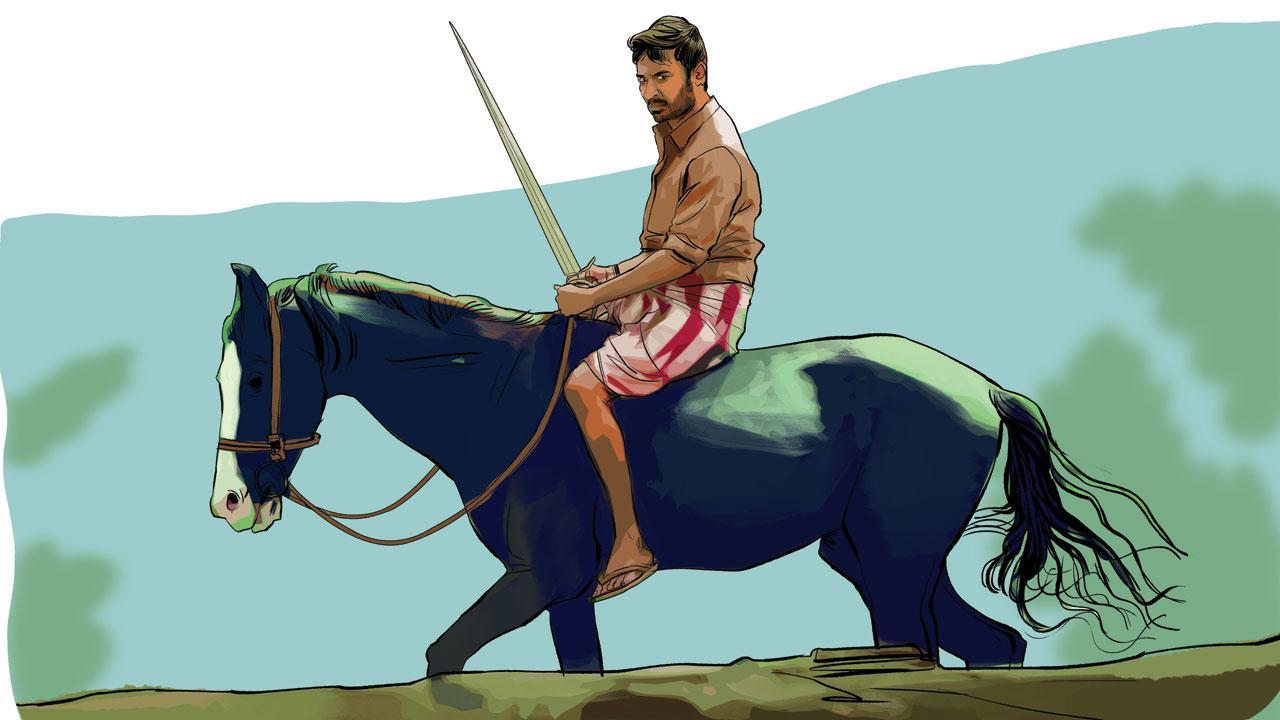Karna, of course, was the son of Kunti and Surya, the sun god, who was abandoned; Kunti later became mother to the Pandavas, but avoided acknowledging Karna, who remained the perennial outsider.

Illustration/Uday Mohite
One of the most unforgettable moments in Mari Selvaraj’s Karnan (Tamil), starring Dhanush, is when a murderous police officer destroying a village, bursts into a house, and is cravenly offered a tiny baby, just born at that instant, dripping blood. Extreme violence is momentarily paralysed when confronted by extreme vulnerability and innocence. It is one of many epic moments in Karnan, a ferocious, explosively good film, streaming on Amazon Prime Video. A modern retelling of the myth of Karna from the Mahabharata, it is set amid the struggles of the low castes, led by Karnan, a Tamil ‘Samurai’.
Karna, of course, was the son of Kunti and Surya, the sun god, who was abandoned; Kunti later became mother to the Pandavas, but avoided acknowledging Karna, who remained the perennial outsider.
In Selvaraj’s stunning debut Pariyerum Perumal (The God on a Horse, 2018), a law student tries to use discussion to dissuade violent upper castes. By his second feature Karnan, Selvaraj acknowledges that only a smash-and-grab approach will work if the low castes want justice in today’s India. His narrative, more expansive and layered, is imbued with mythology, metaphors and magic realism. Despite Karna having illustrious precedessors in Shyam Benegal’s Kalyug and Mani Ratnam’s Thalapathi, Karnan walks tall.
The story is of Karnan (Dhanush), whose obscure village of Podiyankulam doesn’t even have a bus stop. It keeps the villagers isolated, unable to get an education or good jobs and escape, remaining at the mercy of the upper castes. Petitions for a bus stop come to nought; when the bus conductor dismisses their village as ‘wasteland,’ Karnan and the villagers stage a spectacular smash-up of the bus. The villagers destroy the thing they need most: one of many contradictions Selvaraj details. The police, led by Kannapiran (Kannabiran, or Lord Krishna, played by cinematographer-actor Natarajan Subramaniam), are outraged, not because a bus was destroyed, but because of how low caste villagers are ‘arrogant’ for standing (normally) and talking (normally, not obsequiously) before the police, and are named Duryodhana or Abhimanyu. Karnan and the villagers smash the police station when their elders are thrashed. *Spoilers ahead. The police retaliate by destroying the village, beating up women, children and men. Karnan, who had left for a long dreamed-of CRPF government job, returns to fight the police. Finally, Karnan beheads the police officer, seeing no other way to start ending centuries of injustice and entitlement. At that moment, a woman gives birth—there’s birth, death, liberation and destruction—all in one epic moment. When Karnan finally returns from jail, the village celebrates a Pyrrhic victory: many lives were lost, yet the village now has a road and a bus. *Spoiler ends.
Mari Selvaraj’s direction is outstanding, reinforcing Tamil cinema’s place at the peak of Indian cinema, along with Malayalam cinema. Dhanush is remarkable as Karnan: he becomes a pariyerum perumal, a ‘Samurai’ in rubber chappals. Subramaniam as the cop and Lal as Yeman, Karnan’s mentor/buddy, are excellent too. Rajisha Vijayan, so credible in her last film, Rahul Riji Nair’s Kho Kho, has little to do here as Draupadi. Selvaraj’s screenplay superbly tackles the nuances of caste, with individual characters and story arcs. Karnan, who dismisses an eagle attacking a chicken as inevitable, releases a donkey, whose legs are tied, to prevent it escaping, before his angry young man finds purpose. When he sacrifices his job that would have changed his destiny, to stay back and fight for the village, he is like the Buddhist deity Avalokitesvara, who postpones his own Buddha-hood until he has helped every sentient being achieve moksha—but in a very violent avatar. Selvaraj subverts the epics with a flourish: In the Mahabharata, Arjuna won Draupadi by hitting a fish-eye with his arrow at her swayamvar; here Draupadi pursues and marries Karnan. *Spoiler alert. Karnan dramatically slices a fish in two with his sword in mid-air to honour tradition, not for any woman. And the low caste Karnan actually beheads the police officer Kannapiran, Lord Krishna! *Spoiler ends.
The low castes know they can’t count on Hindu gods for justice and equality. Arjuna merely hits a fish-eye; Selvaraj hits a truck of TNT! Villagers repeatedly throw stones at the police: echoes of marginalised Indian people’s struggles nationwide, from Kashmir to Kanyakumari. The film’s haunting metaphors include a headless Buddha statue, as well as Karnan’s little sister, who dies on the road abandoned, transforms into Kattu Pechi, a deity/spirit in a face-mask, who returns to cheer Karnan’s triumphs. This ‘Dalit’ Karnan has, in deed, become a Kshatriya warrior, and a Brahmin by doing his duty, sacrifice, teaching others, and burnt offerings (the bus!). Only, he doesn’t know it. Theni Eswar’s cinematography (Merku Thodarchi Malai) is brilliant; editor Selva RK keeps its 2h 36mins gripping. Santhosh Narayanan’s stand-out music combines hypnotic folk music with the Macedonian Symphonic Orchestra. Kudos to Kalaippuli S Thanu for producing this film.
Meenakshi Shedde is India and South Asia Delegate to the Berlin International Film Festival, National Award-winning critic, curator to festivals worldwide and journalist. Reach her at meenakshi.shedde@mid-day.com
 Subscribe today by clicking the link and stay updated with the latest news!" Click here!
Subscribe today by clicking the link and stay updated with the latest news!" Click here!









